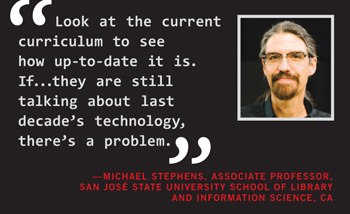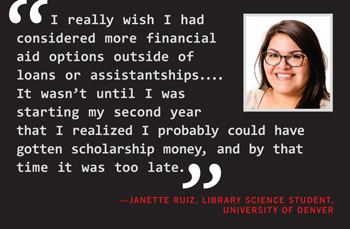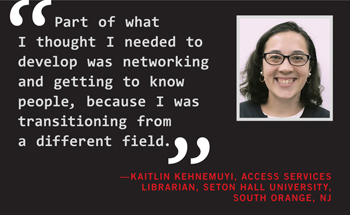The Right School for You
Whether you have only recently decided to pursue librarianship and are eager to learn the ropes, or have been working in libraries for years and are hoping for the expanded opportunities that the degree can bring, finding an MLIS program that is right for you depends on a number of factors.
Find the fit, focus, flexibility, and funding to launch your library career
A significant majority of professional U.S.-based librarian positions require a graduate degree from an American Library Association (ALA)–accredited library school. As LJ noted in “How To Become a 21st Century Librarian” (2013), choosing a program that fits your goals and priorities is a key part of the equation. Whether you have only recently decided to pursue librarianship and are eager to learn the ropes, or have been working in libraries for years and are hoping for the expanded opportunities that the degree can bring, finding an MLIS program that is right for you depends on a number of factors.
 ONLINE OR ON CAMPUS?
ONLINE OR ON CAMPUS?
While plenty of LIS institutions offer a traditional classroom experience, the growing trend is for students to take some or all of their coursework online. Online programs permit students to take classes from their homes or anywhere in the world, and asynchronous classes—featuring prerecorded lectures and threaded discussion boards rather than requiring students to log on at a particular time—mean students can engage with the course content at whatever time they wish. The flexibility afforded by online programs can make a great difference to students with family obligations, full-time jobs, or an inability to travel to the program of their choice.
When selecting an online program, take into account the existence of on-campus requirements such as an in-person orientation, the use of synchronous versus asynchronous teaching, the technology required to take and contribute to classes effectively, and the opportunities to connect with fellow students through tools such as chat or social media.
LJ columnist Michael Stephens, who teaches exclusively online as an associate professor at San José State University’s School of Library and Information Science, CA, recommends that students “look for a program you can afford, and look for an online program.” In assessing one online program over another, Stephens says that students should “look very closely at how programs are delivered,” and “look for a program that offers multimedia instruction, web conferencing,” and other more dynamic and interactive methods rather than relying exclusively on recorded lectures and written discussion posts.
It is also worth questioning the extent to which professors make themselves available to students by email or social media. Even, or perhaps especially, for online programs, Stephens, a 2005 LJ Mover & Shaker, tells LJ, it is important to note whether the school offers “a program with internships, active student groups, an ALA chapter, [or] a [Special Libraries Association] chapter. Look for a program that has a presence at the ALA annual [conference], or a state library association level,” as those types of professional events offer a chance to meet professors and fellow students.
Of course, online learning is not for everyone. Prospective students should consider whether they can commit to learning independently online, or whether meeting in-person with professors and fellow students will keep them on track. They may use computers all day in their work and not be up for additional hours of screen time. They may prefer the networking and group learning opportunities of an in-person program, as well as the opportunities for hands-on learning in the classroom or on field trips. For those hoping to go into specialities such as rare book preservation and conservation, such instruction can be essential. The location of an in-person program will be critical, as students will need to commute there multiple times per week.
Janette Ruiz, who is currently studying library science at the University of Denver and has written for Hack Library School about choosing a program, started her library school research assuming that an online program would be the best choice to earn a degree while working full time. She changed her mind, however, after attending a Students of Color reception at which students emphasized the support they received from their program, including one who “expressed how without the support they received from the program and their professors, they were uncertain whether grad school would have normally been as welcoming of an environment to a person of color.” This in-person visit, along with the school’s emphasis on scheduling classes in the evening so that students could work and gain experience during the day, increased her confidence in choosing that program over an online degree.
 COMPARING ACADEMIC PROGRAMS
COMPARING ACADEMIC PROGRAMS
The initial hurdle for any LIS applicant will, of course, be the school’s admission requirements. Any graduate program will require an undergraduate degree from an accredited university; some will have higher expectations for applicants’ previous scholastic achievements than others. Some, but certainly not all, programs require Graduate Record Examination (GRE) or other admission test scores. Those who wish to pursue a dual degree will also need to consider the requirements of the second degree, which may differ from the library science requirements.
Any person who hopes to work as a librarian in the United States will want to attend an ALA-accredited program—ALA accredits programs in the United States, Canada, and Puerto Rico and offers an online directory of those programs.
At their core, all of these teach librarianship—but there are many types of librarian, and schools differ in their concentrations. Consider whether a school emphasizes areas like archives, school librarianship, technology, or academia. Many schools offer certificates or “tracks” that allow interested students to focus their studies on a particular area, becoming experts in topics such as digital humanities or user experience design.
While all library schools make available the standard MLIS degree, some will offer additional degrees like a PhD, or dual degree programs that combine the MLIS with another degree such as a Juris Doctor (JD) for law librarianship or a master’s in another subject like history or art history. Even for students who do not want to pursue an additional degree, that a school has such academic programs will hint at the academic focus of the institution or the research interests of the faculty. For students hoping to become school librarians, it will be important to research certification requirements in your area and assess whether a particular library school can support completion of those requirements in a timely manner. One thing to be aware of is that students’ career interests can shift in the course of their graduate program, so too narrow a focus on a particular specialty can leave them in a tough spot if they decide to change course. Also, a still-tight job market can make it harder for them to get exactly the position they trained for, where a broader focus might lend some flexibility.
Stephens suggests looking on a school’s website at “the current curriculum to see how up-to-date it is. If you look and they are still talking about last decade’s technology, there’s a problem.” He also recommends checking that a school covers current library trends and issues of interest such as Maker spaces, blockchain, and coding. See if a library school aims to address current issues of social justice and equitable service. “If you look at a school’s curriculum, sometimes red flags go off,” indicating their approach is out-of-date, he says. A school that lacks programming in current technology topics such as web development, instructional technologies, and basic data analytics will not prepare students adequately for the field. Choosing the right library school involves selecting one that stays current on the ways in which today’s librarians actually work.
Prospective students must also consider a school’s graduation requirements, including coursework. How many credits can students take per semester, and how long will it take to complete the degree? In addition, library schools frequently want students to take basic classes such as information technology and cataloging, giving varying levels of flexibility when it comes to electives. Many programs require a final project such as a thesis or a portfolio. Others want students to undertake an internship, working in the field, prior to graduation. Deciding between a school that prioritizes written work and projects versus experiential learning can make a difference in a satisfying educational environment.
It will also be important to determine whether a program supports a diverse student body. According to Renee Hill, senior lecturer with the University of Maryland College of Information Studies and winner of the 2017 LJ/ALISE Excellence in Teaching Award, “LIS schools have historically had low percentages of students (and faculty/staff) from underrepresented and/or marginalized communities.” That number is growing, she said, and suggests that prospective students check ALA’s searchable database of programs that “link directly to specific school sites as well as demographic information. Another thing that is helpful is to view the program and course offerings at various schools. Classes and specializations that focus on issues of diversity, inclusion, accessibility, etc., are a good sign that a school is committed to building and sustaining a diverse, inclusive profession that is welcoming to all.”
 CAREER PROSPECTS AND CONNECTIONS
CAREER PROSPECTS AND CONNECTIONS
Library school is, ultimately, a professional school, and students choose to earn their MLIS degree because they hope to work in this field. The extent to which a school prepares its students to work in their chosen profession, and how it helps them gain employment after graduation, is a critical selection factor.
Prospective library students should assess whether a school provides opportunities for internships over the course of the program. This may involve providing course credit for unpaid externships, or fellowships that connect students with local organizations. It may also involve opportunities for students to connect with professionals in their area of interest via Listservs and career websites, or courses taught by working librarians who can offer insight into career opportunities or pathways.
Sanda Erdelez, division director of the School of Library and Information Science at Simmons University, Boston, notes the value of balancing both academic instruction and experiential education and recommends seeking out a library program that embraces both. “The theoretical principles create the basis of understanding that can be carried on through time, regardless of changes in the practice. This is especially true for all areas that involve technological development,” she says. “Practical skills are also essential, because LIS employers like graduates who can ‘jump’ into their positions without a long learning curve.”
Most library jobs care only that applicants have received a degree from an ALA-accredited school and will not necessarily prioritize one library degree over another, making library school selection far less “prestige” oriented than many other professional credentials. Nevertheless, finding statistics on graduate employment, as well as researching where graduates have found jobs, provides vital information on how the school has prepared and supported their graduates. (For one example, see LJ’s “Salaries Rise Slightly | Placements & Salaries 2018.”)
Kaitlin Kehnemuyi, who graduated from the Pratt Institute in New York City in 2016 and now works as access services librarian at Seton Hall University, South Orange, NJ, chose her on-campus degree over an online one with an eye to networking. “Part of what I thought I needed to develop was networking and getting to know people, because I was transitioning from a different field,” she says. “I knew I needed to meet people” and believed that doing so would be far easier through an in-person program. She also took into account the network of graduates from her school in the New York area.
HOW AM I GOING TO PAY FOR THIS?
Earning a graduate degree can be expensive, and students will want to research how they can earn an MLIS with as little debt as possible, especially since professional librarian positions are not especially lucrative, with an average starting salary of around $45,000. Millions of Americans carry student loan debt, and, according to a recent CNBC report, the average student borrower has more than $37,000 in loans. The cost of a library science degree varies, and a two-year program could cost up to $50,000 in tuition and fees, depending on whether classes are taken in-person or online, or whether the school is private or offers in-state tuition. While tuition is rarely placed front and center in school promotional materials, costs should be available on the program’s website. Graduate programs are frequently priced “per credit,” so be sure to check how many credits are required for graduation.
 Comparison shopping across schools can involve considering programs with in-state tuition, as well as whether a school offers scholarships, grants, or work study opportunities. Some online programs offer in-state tuition to out-of-state residents, and some states participate in a network of reciprocal relationships that extend those options. For those attending library school after already earning another graduate degree, some programs will offer credit and advanced standing that can save the cost of a few credits toward graduation. In addition, schools with more flexible schedules and graduation requirements will make it easier for students to earn their degree quickly while maintaining a full- or part-time job.
Comparison shopping across schools can involve considering programs with in-state tuition, as well as whether a school offers scholarships, grants, or work study opportunities. Some online programs offer in-state tuition to out-of-state residents, and some states participate in a network of reciprocal relationships that extend those options. For those attending library school after already earning another graduate degree, some programs will offer credit and advanced standing that can save the cost of a few credits toward graduation. In addition, schools with more flexible schedules and graduation requirements will make it easier for students to earn their degree quickly while maintaining a full- or part-time job.
Erdelez recommends assessing the cost of library school “in the context of the ‘return on investment.’ For example, programs that are more expensive but provide rich opportunities for networking and working experience in world-class libraries may be better investments than more affordable programs with limited opportunities.” Avoiding steep tuition costs and debt will be high on the list of priorities for any prospective student, and consideration of programs requires a realistic assessment of career goals and opportunities that could necessitate a pricier program.
To evaluate expenditures, look at methods for covering tuition, including loans, grants, scholarships, and graduate assistant positions. According to Maryland’s Hill, “I think it goes without saying that a huge issue is program-related costs” such as tuition, fees, and relocation costs to attend an in-person program. “Those costs add up fast and can be daunting,” she adds. “Quite related, a lot of prospective students are considering balancing academic pursuits with full-time employment and family obligations; doing this can be challenging. But ‘challenging’ is not synonymous with ‘impossible’!”
Hill also points out that each year “millions of dollars in scholarship and grant funds go unused simply because people didn’t apply for them.” The availability of these kinds of funds can change the calculation when it comes to library school affordability. Ruiz tells LJ, “I really wish I had considered more financial aid options outside of loans or assistantships.... It wasn’t until I was starting my second year that I realized I probably could have gotten scholarship money, and by that time it was too late to apply.”
Many schools circulate information on scholarships and grants to their students; local and specialty library associations as well as ALA offer scholarships annually. For librarians concerned about student loans, those pursuing work in public service—including public and school libraries—may qualify for the Federal Public Service Loan Forgiveness Program. While the price of a library science degree can prove intimidating, research into available funding options can alleviate some of the burden.
 GATHERING INFORMATION
GATHERING INFORMATION
As budding information professionals, students will encounter on their very first library school project gathering information on schools of interest and assessing what they find. Students can conduct most of their research on library school websites, which will offer an overview of academic programs, graduation requirements, internship or practicum opportunities, and costs.
It can also be helpful to visit the school’s campus for an information session or a tour. To determine whether a school is a true “fit,” Hill says, “prospective students should carefully view iSchool websites to get a general sense of what the schools are like. Then, if possible, it’s a good idea to tour a few schools specifically as well as the broader university communities. It’s surprising how even a couple of hours spent looking around and talking to a few people can give a person useful information for decision-making.”
At networking events or through social media such as Facebook groups, current professionals can offer invaluable perspective on what library school provides the best opportunities, as well as realistic feedback on what they wish they’d done differently. In assessing a particular program, the most valuable resource will be current students, who can be found at an information session or contacted through the school and working librarians in a prospective student’s region or area of interest. Prospective students should seek out the information beyond what the admissions office and school promotional materials provide, and that can best be found by touching base with students and recent grads not handpicked by admissions, such as through social media groups or Listservs or local librarian networks. Conversations with these students should explore what they found challenging in the school environment, whether they felt prepared for professional librarianship, and whether they found the school to be a supportive place to learn.
Jennifer A. Dixon is Collection Management Librarian, Maloney Library, Fordham University Law School, New York
RELATED
ALREADY A SUBSCRIBER? LOG IN
We are currently offering this content for free. Sign up now to activate your personal profile, where you can save articles for future viewing










Add Comment :-
Comment Policy:
Comment should not be empty !!!